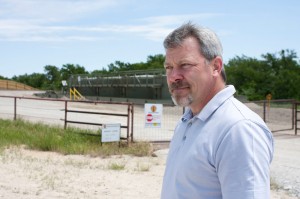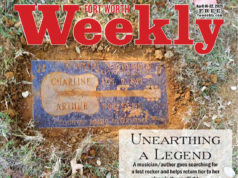When Ron Gulla, a heavy-machinery salesman, leased the mineral rights on his Pennsylvania property in 2002, he said, he was told that standard vertical gas wells would be drilled and that in exchange for allowing the work, he’d get more natural gas than he could ever use on his 141 acres. “I thought it was a good deal,” he said recently. “Standard wells and I’d get free gas forever.”
But when Range Resources began actual drilling on his property in 2005, he discovered that the company was drilling horizontal wells into a deep shale formation. Those wells — four in all — had to be blasted open with millions of gallons of water, sand, and poisonous chemicals, most of which returned to the surface with a vengeance and were put into huge ponds dug into his property near the wells. Within months, Gulla’s two-and-a-half-acre stocked fishpond had turned black and the fish were dying. He contends that was a result of the chemical-laden water in the frack pond leaking downhill into his fishpond, but when he complained to Range that its flow pits were responsible for the damage, the company denied responsibility.
That was the beginning of a several-year-long battle that ultimately cost Gulla his peace of mind, his family’s security, and the farm.
When the first well went in on Gulla’s property, it was only the second horizontal well ever drilled in what’s now known as the Marcellus Shale, the largest known gas play in the U.S., stretching from Ohio through Pennsylvania, New York, Vermont, and down into West Virginia.
As happened with the gas boom in Fort Worth, people like Gulla and thousands of others had no idea what was coming. The landmen who secured the leases talked about the bonus money and royalties or the free gas that landowners would get. They talked about the 350,000 wells already dug in Pennsylvania over the last hundred years and had people thinking of oil crickets in their front yards pumping money all day long.
According to Gulla and others, residents weren’t told about the fracking fluids that would poison the air they breathed or the thousands of trucks that would tear up their roads transporting the millions of gallons of water each well fracture would require. They weren’t told about fugitive methane and volatile organic compound emissions that would continually leak from wells, compressor stations, and other equipment and would make them sick. They had no idea that water wells would go bad, that leaks from waste pits would kill their cattle and horses. They had to discover those things as they went along.
Gulla and others whose leases were owned by Range Resources, a Fort Worth-based company and the major player in the Marcellus Shale, also discovered that asking Range to rectify a problem could lead to lawsuits: The company is known for aggressively going after people it thinks are threatening its brand.
In one case in Pennsylvania, when paying off a family for making their property unlivable due to the air quality, Range and three other companies demanded a confidentiality agreement that not only included the standard “no discussion of this settlement” clause, but forbade the couple’s two young children from ever talking about the case and forbade the parents from ever attending any public meeting where oil and gas would be discussed.
In a Parker County case, Range sued not only a homeowner who claimed its work ruined his water wells but also the person he hired to test the levels of methane in his wells. And the homeowner’s wife. And then the company subpoenaed several years’ worth of e-mails from a blogger who had posted a video of the man setting his well water on fire.
And on at least one occasion, Range boasted of having a number of former military psychological-warfare operatives on its team to deal with mineral-rights owners who didn’t want to lease their rights.
The drilling company even publicly demeaned an asset management group that had a sizable investment in Range. The assets group had asked Range to use equipment that would capture fugitive emissions, a practice that would benefit stockholders because that gas could be sold rather than being released into the air, as well as benefitting the health of people living near drilling areas who would no longer have to breathe the poisons.
“They, Range, don’t try to win their cases — they try to punish people,” said Calvin Tillman, former mayor of DISH, Texas, who has had several run-ins with Range Resources.
********
All oil and gas companies screw up occasionally: There are spills, leaks, pipe failures, well blowouts, and sometimes explosions. The industry as a whole fights tooth and nail to avoid taking responsibility for those things.
In the case of horizontal natural gas fracking, there are also hundreds, perhaps thousands of cases where nearby water wells went bad shortly after the drilling started. Wells that produced clean, drinkable water for years suddenly changed color and smell, becoming heavy with gas and other chemicals. Since a direct connection between the gas well and the water well is difficult to prove, drillers generally fight to avoid accepting responsibility for as long as they can before, in many cases, ponying up and paying off the aggrieved landowners. Then they usually seek confidentiality agreements permanently prohibiting the landowners from talking about the problem or the settlement.

In the countryside just outside of Hillsboro, Texas, in 2006, within days of Williams Production-Gulf Coast Company fracking a new well, three nearby water wells went bad. The water at first vanished from the wells, then came back with such pressure that it blew out piping and subsequently killed several farm animals that drank it (“Water Foul,” April 30, 2008). At first Williams denied any connection between its gas well and the water wells going bad. The company did provide clean water to the three families for a period of time but then cut that off, saying its investigation showed no connection between the company’s work and the water well problem.
For many affected residents, that’s the end of the line. They haven’t the money or knowledge to fight a deep-pocketed outfit. But one of the Hill County landowners did continue the fight. Once the situation began to be publicized, Williams quietly settled with the three families without acknowledging guilt and had them sign confidentiality agreements.
Tillman’s take on Range Resources can be seen in a parallel situation that occurred in Parker County in 2009.
A couple of months after Range started fracking two wells there, several families noticed that their water wells had soured. One of the homeowners, Steve Lipsky, had been feeling sick for weeks with nausea, headaches, and other symptoms. He thought his well water, which had begun to foam like Alka-Seltzer and smelled horrible, might have been contaminated by the nearby drilling. It was so bad that he could actually set a match to the water coming out of his well and cause flames to shoot out of the hose.
He contacted the Texas Railroad Commission, which oversees gas and oil production in this state, and called in Alisa Rich of Wolf Eagle Environmental to test the well. At the time Rich told Fort Worth Weekly that she could smell the methane from the water well before she’d even reached it.
When her test results came in, they showed that the well was indeed contaminated with very high levels of methane. The Railroad Commission’s test came back positive for high levels of the carcinogen benzene as well. The Lipskys were told that they should stop using the well water for any purposes.
Lipsky sent an e-mail with a video of his garden hose shooting flaming water to Sharon Wilson, a longtime opponent of gas drilling, who posted it on her Bluedaze blog. It drew a lot of attention.
The federal Environmental Protec-tion Agency was contacted as well, and after conducting an investigation, the EPA issued an emergency order stating that Range had caused or contributed to the gas in the Lipskys’ water well — contamination that included methane, toluene, benzene, ethane, and propane.
The emergency order said that the Railroad Commission had not addressed the issue sufficiently and directed Range to take several actions, including supplying the Lipsky household with fresh water, conducting soil surveys in the area, and, most importantly, submitting “a plan for EPA approval identifying gas flow pathways to the Trinity Aquifer, eliminating gas flow to the aquifer if possible, and remediating impacted areas of the aquifer.”
Shortly thereafter, in January 2011, the Railroad Commission held two days of hearings on the issue. That March, the commission issued a final order, concluding that Range’s gas wells had had no impact on Lipsky’s water.
After that, the EPA withdrew its emergency order.
Lipsky then sued Range and several other defendants for contaminating his water well, claiming the pollutants were a result of Range’s drilling activities.
A month after Lipsky filed suit, Range countersued both Lipsky and his wife Shyla, along with Alisa Rich, for civil conspiracy, aiding and abetting, defamation, and business disparagement.
At the same time, Range subpoenaed all of Wilson’s e-mails from 2005 that contained the word “range” or “resources” — an impossibly large task for a blogger who receives hundreds of e-mails per day from people all over the country concerned with natural gas drilling.
Lipsky’s wife and Rich filed to have themselves removed from the lawsuit on the grounds that there was no conspiracy, among other reasons. Rich’s attorney, George Carlton, said, “Our client was hired to do testing, did testing, and reported the findings. Range then sued her for business disparagement and defamation and conspiracy — Range said she was in a conspiracy and aiding and abetting with the Lipskys to defame and disparage Range. The court of Parker County denied our appeal to dismiss her from the lawsuit.”
Rich and Lipsky’s wife appealed, and in April 2013, the Second Circuit Court of Appeals in Fort Worth dismissed them both from the case. But Carlton said that Range Resources, despite having sold off its interest in gas fields in Parker County (including the wells in the Lipsky case), “just recently filed an appeal to the Texas Supreme Court asking that Ms. Shyla Lipsky and Rich be reinstated in the lawsuit.”
“You just have never seen a company so arrogant,” said Wilson, who refused to turn over her e-mails to Range. “They just go after you like the biggest bullies, trying to scare you.”
Wilson said that before getting the e-mail with the video of the flaming hose, she’d never known Steve Lipsky. “I knew about the case because it was high-profile and I’d blogged about it, but I had never met the man, and when I got the video, I had to look him up on Google to make the connection that he was the man involved in the Parker County case. And because I posted that video on my blog, Range tried to include me in the so-called conspiracy to defame them.”
At a court hearing on the matter, Wilson got Range to limit the scope of the e-mails it was demanding — which turned out to be very few and certainly nothing that would give the company grounds to include her in a conspiracy lawsuit.
But that didn’t mean Range was done with her. Wilson, who has since become the Texas representative for Earthworks’ Oil and Gas Accountability Project — a nonprofit working at state and federal levels to tighten drilling regulations — has been served with a cease-and-desist order from a Range attorney, aimed at stopping her from blogging about the company.
“I didn’t stop, though,” Wilson said. “And I’m not going to stop blogging about them. I am not afraid of them.”
Wilson has been a thorn in Range’s side for some time. In 2011 she attended an oil and gas industry conference, during which she audiotaped a session on public relations strategy for the gas companies.
One of the speakers was Matt Pitzarella, Range Resources’ director of corporate communications, who told the attendees, “We have several former psy-ops folks that work for us at Range because they’re very comfortable in dealing with localized issues and local governments. Really all they do is spend most of their time helping folks develop local ordinances and things like that. But very much having that understanding of psy-ops in the Army and in the Middle East has applied very helpfully here for us in Pennsylvania.”
Range Resources did not return phone calls and messages for comment on this story.













Please join us on Face Book Group: No Fracking Way
The Truth will prevail and their, Range’s, bully tactics and that of other gas companies, like Cabot and WPX in our county in Pa. , will not stop the Truth from coming forth and their antics and polluting practices from being exposed. We will continue to expose them and show the world what they are doing to our beautiful rural areas.
Beautiful article, Peter. I’m proud to know you.
What a distortion of the truth. Did Ron Gulla tell you that the “machinery “he sold was in fact oil field equipment? That he knew full well what type of drilling was taking place?
I live in Mt Pleasant and know both the Hallowich and the Gulla properties. There is no toxic environment or other issues at either. Both have families happily living in them with no issues.
For the past 5 years I’ve read about all of the negative effects and environmental consequences of shale gas. Where are they?? Mt Pleasant is the same rural community I grew up in. Yes, there is more traffic at times, but the local businesses are doing good and the farmers are doing even better.
Peter Gorman and Jeff Prince of the Fort Worth Weekly deserve the highest awards and applause for their detailed articles like this, that expose so many of the deadly and toxic practices of the gas well industry – like Range Resources, XTO, and Chesapeake. Everyone should see the “Gasland” and “Gasland II” movies on HBO channels or Netflix. God bless the Fort Worth Weekly staff!
There is strength in numbers, so do your part to make the Railroad Commission and TCEQ of Texas and the EPA get quality candidates that aren’t “bought off” by the gas well industry. VOTE for quality candidates, and the people responsible for appointing EPA officials. We need Dr. Al Armendariz back in Dallas on the EPA, Texas Region 6. He’s the one that proved that the gas well industry creates more air pollution in Tarrant County, Texas, than all of the other cars and trucks on these roads.
Thank you to Fort Worth Weekly. From Tarrant County, TX.